
Qiuhe LU
Contact:luqiuhe@cpl.ac.cn
Education
2003–2009 Institute of Microbiology, University of Chinese Academy of Sciences, Ph.D. in Genetics
1999-2003 Lanzhou University, B.S. in Biotechnology
Academic Experience
2025-present Changping Laboratory, Beijing, Leading Scientist
2022-2025 Cleveland Clinic Lerner Research Institute, Ohio, USA, Research Associate
2020-2021 Cleveland Clinic Lerner Research Institute, Ohio, USA, Postdoctoral Fellow
2015-2019 Washington University School of Medicine in St. Louis, Missouri, USA, Postdoctoral Researcher
2009-2015 National Institute of Biological Sciences, Beijing, Postdoctoral Researcher
Overview of Academic Research
Our laboratory is dedicated to advancing research in gut health and disease mechanisms, with a particular focus on unraveling the intricate interplay between diet, the gut microbiome, and the host intestinal mucosal immune system. Our goal is to harness the potential of microbiome-derived bioactive molecules for disease treatment and health maintenance. Leveraging intestinal stem cell in vitro culture systems alongside animal models, we investigate a wide range of intestinal diseases. Furthermore, we explore human diseases that lack suitable animal models using human intestinal stem cells, driving progress in both fundamental and translational research. These efforts aim to bridge critical knowledge gaps and pioneer innovative therapeutic strategies. Key research areas include:
1. Functional Gut Microbes and Bioactive Molecules: We screen and identify key microbial strains within the gut microbiome that exhibit significant biological activity, along with their encoded bioactive molecules (e.g., small molecules and enzymes). Our work evaluates the potential of these functional microbes and molecules for applications in bioengineering and disease treatment.
2. In Vitro Intestinal Stem Cell Research Platform: We refine and develop advanced organoid and spheroid-based intestinal stem cell culture systems to create in vitro platforms for studying gut microbiome-host interactions, mucosal immunity, infectious diseases, and other intestinal disorders. These platforms provide cutting-edge tools for advancing research on digestive tract diseases.
Major Honor and Awards
2009 Outstanding Graduates of the University of Chinese Academy of Sciences
2009 Chu Yuet Wah Scholarship for Outstanding PhD Student, University of Chinese Academy of Sciences
2008 Director's Award of the Institute of Microbiology, Chinese Academy of Sciences
2008 Pacemaker to Merit Graduate students of the University of Chinese Academy of Sciences
2008 First Class Award for Outstanding Performance in State Key Laboratory, Chinese Academy of Sciences
2007 First Class Award for Outstanding Performance in State Key Laboratory, Chinese Academy of Sciences
2006 Merit Graduate Student of the University of Chinese Academy of Sciences
Representative Research Achievements
1. Lu, Q.*, Hitch, T.C.A., Zhou, J.Y., Dwidar, M., Sangwan, N., Lawrence, D., Nolan, L.S., Espenschied, S.T., Newhall, K.P., Han, Y., Karell, P.E., Salazar, V., Baldridge, M.T., Clavel, T. and Stappenbeck, T.S. (2024). A host-adapted auxotrophic gut symbiont induces mucosal immunodeficiency. Science, 385, eadk2536. 10.1126/science.adk2536.
2. Zhang, S., Han, Y., Schofield, W., Nicosia, M., Karell, P.E., Newhall, K.P., Zhou, J.Y., Musich, R.J., Pan, S., Valujskikh, A., Sangwan, N., Dwidar, M., Lu, Q. , and Stappenbeck, T. S. (2023). Select symbionts drive high IgA levels in the mouse intestine. Cell Host & Microbe, 31, 1620–1638, 10.1016/j.chom.2023.09.001.
3. Lu, Q.*, and Stappenbeck, T.S. (2022). Local barriers configure systemic communications between the host and microbiota. Science, 376, 950-955. 10.1126/science.abo2366.
4. Lu, Q.*, Li, S., and Shao, F. (2015). Sweet talk: Protein glycosylation in bacterial interaction with the host. Trends in Microbiology 23(10):630-641.
5. Lu, Q.*, Yao, Q., Xu, Y., Li, L., Li, S., Liu, Y., Gao, W., Niu, M., Sharon, M., Ben-Nissan, G., Zamyatina, A., Liu, X., Chen, S., and Shao F. (2014). An iron-containing dodecameric heptosyltransferase family modifies bacterial autotransporters in pathogenesis, Cell Host & Microbe, 16(3):351-63.
6. Yao, Q.*, Lu, Q.*, Wan, X., Song, F., Xu, Y., Zamyatina, A., Huang, N., Zhu, P., and Shao, F. (2014). A structural mechanism for bacterial autotransporter glycosylation by a dodecameric heptosyltransferase family, eLife, 3: e03714.